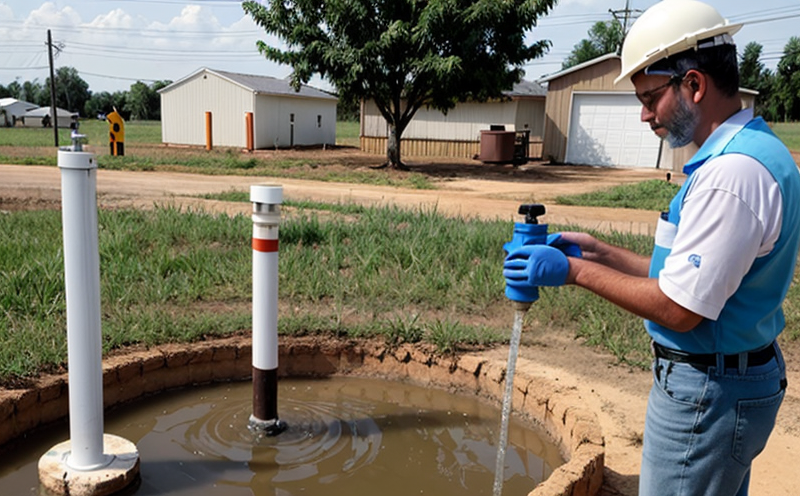ASTM D7575 Oil and Grease Testing in Groundwater
The testing of oil and grease in groundwater is critical for understanding the contamination levels present, particularly in areas where industrial activities, fuel storage facilities, or other potential pollution sources are located. ASTM D7575 provides a standardized method for determining the concentration of petroleum hydrocarbons in water samples, which includes both free floating oils as well as emulsified and dissolved forms.
Groundwater contamination can have severe consequences on public health and the environment. Oil and grease from various sources such as fuel spills, leaking underground storage tanks (USTs), or industrial activities can enter groundwater through cracks in pipes, seals, or by percolating down through soil layers. The presence of these contaminants can lead to a range of issues including taste and odor problems, corrosion of metal structures, and potential health risks if ingested.
ASTM D7575 is widely recognized for its ability to accurately measure the amount of petroleum hydrocarbons in water samples. This test method involves extracting oil and grease from water using a solvent such as hexane or pentane. The extract is then analyzed by infrared spectroscopy (IR) or gas chromatography (GC). The standard also specifies the acceptance criteria which ensures that only reliable results are reported.
The ASTM D7575 procedure covers both quantitative and qualitative analysis of oil and grease in water samples. Quantitative analysis provides precise measurements of the total petroleum hydrocarbon content, while qualitative analysis identifies the specific types of hydrocarbons present. This information is invaluable for regulatory compliance, environmental remediation efforts, and ongoing monitoring programs.
For accurate results, proper sample collection and preservation are essential. Samples should be collected in clean containers that minimize contamination from external sources. The samples must then be kept cool to prevent further degradation of the hydrocarbons. Once back at the laboratory, the samples undergo rigorous quality assurance protocols before undergoing extraction and analysis.
The ASTM D7575 method is robust and reliable, making it suitable for a variety of applications including:
- Environmental impact assessments
- Regulatory compliance monitoring
- Site remediation projects
- Industrial wastewater treatment effectiveness evaluation
The standard also takes into account the potential variability in groundwater composition, ensuring that the testing method remains effective across different environmental conditions.
| Sample Type | Expected Contaminants | Acceptance Criteria |
|---|---|---|
| Potable Water Samples | Petroleum hydrocarbons, solvents | Total petroleum hydrocarbon content < 10 mg/L |
| Industrial Wastewater Samples | Petroleum hydrocarbons, surfactants | Total petroleum hydrocarbon content < 25 mg/L |
| Groundwater Samples | Petroleum hydrocarbons, solvents, emulsified forms | Total petroleum hydrocarbon content < 10 mg/L |
The ASTM D7575 method is widely used in the water and wastewater testing sector to ensure that water quality meets regulatory standards. By adhering to this standard, laboratories can provide accurate and reliable results, which are crucial for making informed decisions about environmental protection and public health.
In conclusion, ASTM D7575 provides a comprehensive approach to measuring oil and grease in groundwater samples. Its standardized procedures ensure consistent and accurate results, making it an essential tool for quality managers, compliance officers, R&D engineers, and procurement specialists involved in water and wastewater testing.
Applied Standards
The ASTM D7575 method is based on several international standards that ensure the accuracy and reliability of oil and grease measurements. These include:
- ASTM D7575 - Standard Practice for Determining Oil and Grease in Water by Extraction
- ISO 6803:2009 - Petroleum Products - Determination of Oil and Grease Content by Extraction with Organic Solvent
- IEC International Standard
The use of these international standards ensures that the testing method is consistent across different laboratories, providing a reliable benchmark for oil and grease measurements.
Industry Applications
ASTM D7575 is widely applied in various industries where groundwater quality needs to be monitored. Here are some key applications:
- Environmental Monitoring: Detecting and quantifying petroleum hydrocarbons in groundwater helps in assessing environmental impacts.
- Regulatory Compliance: Ensuring that water samples meet the specified limits set by regulatory bodies for oil and grease content.
- Industrial Wastewater Treatment: Evaluating the effectiveness of treatment processes to ensure compliance with discharge limits.
- Site Remediation: Monitoring remediation efforts to ensure contaminant levels are reduced to safe thresholds.
- R&D Projects: Studying the long-term effects of oil and grease contamination on different ecosystems.
The table below summarizes the key applications along with their respective expected contaminants:
| Application Area | Expected Contaminants |
|---|---|
| Environmental Monitoring | Petroleum hydrocarbons, solvents |
| Regulatory Compliance | Petroleum hydrocarbons, emulsified forms |
| Industrial Wastewater Treatment | Petroleum hydrocarbons, surfactants |
| Site Remediation | Petroleum hydrocarbons, solvents, emulsified forms |
| R&D Projects | Petroleum hydrocarbons, trace elements |
These applications demonstrate the versatility and importance of ASTM D7575 in maintaining water quality standards across different sectors.
EuroLab Advantages
At EuroLab, we pride ourselves on offering comprehensive groundwater testing services that are compliant with ASTM D7575. Our advantages include:
- ISO 17025 Accreditation: Ensuring the highest level of quality in our laboratory practices.
- Expertise and Experience: Leveraging years of experience in environmental testing to deliver accurate results.
- State-of-the-Art Equipment: Using cutting-edge technology for precise extraction and analysis.
- Rigorous Quality Control: Implementing strict quality assurance protocols throughout the testing process.
- Comprehensive Reporting: Providing detailed reports that meet regulatory requirements.
- Customer Support: Offering assistance with sample collection, interpretation of results, and compliance advice.
EuroLab's commitment to excellence ensures that our clients receive reliable and accurate oil and grease testing in groundwater.





